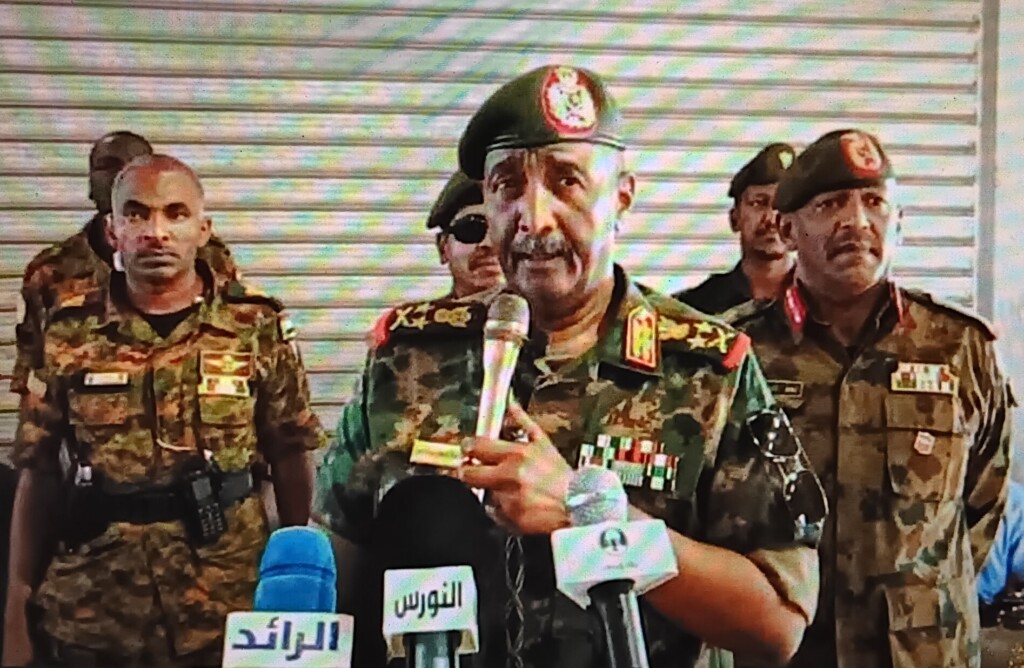Sudan ceasefire hopes dashed as Jeddah SAF-RSF talks suspended

Lt Gen Abdelfattah El Burhan, chairman of the Sovereignty Council and commander of the Sudan Armed Forces, giving a speech (Sudan Sovereignty Council)
Negotiations in Jeddah on a ceasefire between the Sudan Armed Forces (SAF) and paramilitary Rapid Support Forces (RSF), have ended in a deadlock, and suspended for an indefinite period. Reliable sources say that the latest talks, brokered by Saudi Arabia, the USA, the African Union, and the Intergovernmental Authority on Development (IGAD), have reached a stalemate, and that both delegations are returning to Sudan to consult with their leaders.
Yassir Arman, spokesperson for the Forces for Freedom and Change (FFC), said in a comment on his X account yesterday that the Jeddah negotiations are not making any progress due to lack of political will.
Arman said that the speech of El Burhan in Wad Madani, capital of El Gezira, earlier on Sunday (see below), is a talk for war, not for peace. He added: “If we go beyond much what was mentioned in Burhan’s speech today, is it reasonable to threaten the envoy of the Secretary-General of the United Nations, Ramtane Lamamra, before he sets foot on the territory of Sudan and before he meets with the concerned parties?”
Arman continues that if this is motivated by cancelling the mandate of UNITAMS, then that is just a small step. “The issue of war is complex, and the issue of protecting civilians, stopping human rights violations, delivering relief to the needy, and stopping and ending the war is more complex. The new envoy is Algerian and African, and Algeria sees with eyes into the Arab world and Africa. Threatening language will not help. What is useful is that we actually work to stop this war, as this war is destroying our country and will lead to the complete collapse of the state, so the best option for our people is to stop it. We must not deceive the people, as the Jeddah negotiations do not make any progress due to the lack of political will, and today’s speech is talk of war, not peace.”
Lt Gen Abdelfattah El Burhan, chairman of the Sovereignty Council and commander of the Sudan Armed Forces (SAF) welcomed the UN Security Council’s decision to terminate the work of UNITAMS in Sudan and transfer its tasks to the specialised United Nations agencies operating in the country.
El Burhan warned the new UN official Ramadan Lamamra of a similar fate as his predecessor, Volker Perthes, if he sides with one of the Sudanese parties, and stressed during a speech in Wad Madani on Sunday the continuation of the cooperation of the government of Sudan with the United Nations in the event of a neutral mission that helps restore security and stability.
The SAF commander criticised those who call for a solution to the Sudanese crisis from abroad, and ridiculed the Sudanese who “are begging in the capitals of the world to find solutions to the Sudanese crisis”. He stressed that the solution to the Sudanese crisis comes from within Sudan and from among the people who were displaced after their land and homes were usurped. “There is no solution that comes from abroad, and no solutions are imposed on us, whoever wants a solution must come to Sudan.”
El Burhan said that the negotiating delegation went to the Jeddah platform with an open heart to reach peace, however, he stressed that any negotiations that do not meet the desire of the Sudanese people will not be acceptable, and continued saying in this regard “negotiations that do not put an end to this rebellion [of the RSF] and a final exit from the combat zones will not be acceptable”.
Former Foreign Minister Omar Kamareldin Ismail called for the launch of a wide campaign to monitor and document war crimes and crimes against humanity suffered by the Sudanese people in the ongoing war.
He told Radio Dabanga about the importance of documentation in order to restore rights and ensure that such tragedies are not repeated and to restore the rights of the victims, achieve justice and ensure that there is no impunity, by conducting trials to punish the perpetrators who committed war crimes and crimes against humanity.











 and then
and then